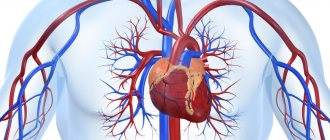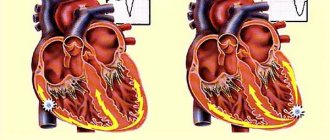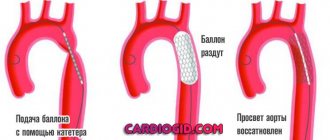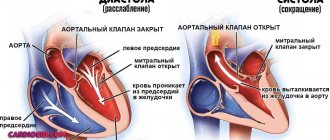All according to plan
In general, women with any heart problems should not become pregnant by accident - they should prepare for childbearing in advance and carefully.
Article on the topic “Sweet” burden. What are the dangers of diabetes in pregnant women?
Once pregnant, heart patients need to be regularly monitored by a specialized doctor and often (sometimes constantly) take heart medications. In the first 20 weeks you need to visit a doctor once a month, then every 2 weeks, and for the last 2 months - weekly, and even more often if there are problems.
Also, the heart patient must be prepared for at least three hospitalizations during pregnancy: at 8–10, 28–30 weeks and 2–3 weeks before birth. And of course, you will have to switch to an easier job or leave the service altogether, rest more, walk in the fresh air, eat right, and avoid stress. It is also necessary to protect yourself from any infectious diseases and anemia, and monitor weight gain.
Who can give birth
There are no obstacles to childbirth only for those women suffering from rheumatic heart disease who:
- They feel good and cope with everyday physical activity (first degree of risk).
- And for those who experience shortness of breath and increased heart rate only during heavy physical exertion (second degree of risk).
In these cases, everything, as a rule, works out well for both the mother and the fetus. Children are born full-term, grow and develop in the same way as children of healthy mothers.
But with the third and fourth degrees of risk, it is not recommended to give birth, since shortness of breath in patients is observed even at rest, worsens from minor strains and childbirth is unsafe, and the child may be born weakened.
Risky choice
Today, with many cardiac problems, women give birth safely. By the way, even during pregnancy, surgical operations can be successfully performed - for example, to restore the mitral valve. Although, in order to avoid miscarriage and premature birth, it is better to do this at the stage of pregnancy planning.
Article on the topic
Don't be afraid of doctors. A woman can be cured of many diseases in 15 minutes
However, there are pathologies in which doctors will object to motherhood. Of course, no one will force a woman to have an abortion - the decision is always up to the patient. But it is still very important to soberly assess the degree of risk, because in some pathologies the fatal outcome during pregnancy, and even more often during or immediately after childbirth, is very high. It is extremely dangerous if a pregnant woman has an active rheumatic process, which causes acquired heart defects. If in the early stages (up to 12 weeks), based on a comprehensive examination, an exacerbation of endomyocarditis or even the presence of a sluggish rheumatic process is detected, the doctor will recommend an abortion and subsequent anti-rheumatic treatment. Continuing such a pregnancy is too dangerous for both the baby and the mother. Even after complete recovery, the rheumatic process in the heart lasts another 7–8 months, so you will have to take protection for another whole year.
Blood conflict. Why is it dangerous to have a different Rh factor during pregnancy?
More details
Why congenital heart defects form and what pregnant women need to know
Where can I get diagnosed with cardiovascular diseases in Kyrgyzstan?
1) MC “Cardio Asia +”, Osh
Medical has been operating since December 21, 2012. The clinic provides high-tech cardiac care, and from 2021, modern neurosurgical care.
The specialists of the Cardio Asia+ MC have a prestigious reputation and are leading experts in their field. They will help to establish the cause of pain in the heart, arrhythmia, arterial hypertension and a number of problems. The main advantage of the company is an individual approach to each client, which allows the company’s employees to correctly diagnose and treat.
Cardio Asia+ uses the most innovative methods for diagnosing and treating heart diseases. The clinic is equipped with high-class equipment. In its work, the organization uses only safe and high-quality products from trusted manufacturers. A distinctive feature of the company is the constant support of the patient, which makes it possible to improve well-being and prevent complications and other problems.
I would like to note that such experienced, highly qualified cardiac surgeons as Eraliev Talant Kakanovich, Kamchybek Isabaev, Adaham Davydov work in Osh. It should be noted that on November 26, 2020, for the first time in Kyrgyzstan, on the basis of the Osh Regional Medical Clinical Hospital, together with the doctors of Cardio Asia Plus, endovascular radiosurgeons Eraliev Talant Kakanovich, Krestyaninov Oleg Viktorovich and Ashirov Kanat Turgunbaevich, a unique operation was performed to implant the aortic valve to Osh State University professor Dr. mathematical sciences Karimov Sala Karimovich.
In mid-February 2021, the following operations were performed:
- More than 20 diagnostic procedures;
- Surgeries for congenital heart defects: atrial septal defects and open aerial ducts are closed with occluders
- Performed technically complex percutaneous coronary interventions for lesions of the coronary vessels
- Aortic endoprosthetics for infrarenal aneurysm
- Stenting for carotid artery stenosis
- Recanalization and stenting for lesions of the subclavian arteries.
All interventions were successful.
2) Research Institute of Heart Surgery (NIIHSTO)
The operations are performed by an experienced cardiovascular surgeon, arrhythmologist Abay Turdubaev.
Let's talk about another clinical case of a patient with heart rhythm disturbances (arrhythmia), which occurred in early February 2021.
Patient O., 57 years old, has been complaining for the last three years of prolonged, rhythmic rapid heartbeat, which occurs suddenly and lasts more than 12 hours. Due to the increased frequency of attacks and duration, the cardiologist referred us to the “NIIHSTO” of the Ministry of Health of the Kyrgyz Republic for EPI and RFA.
According to electrocardiography (ECG) taken at the time of the attack, a diagnosis of atrial flutter was established.
Atrial flutter (AFL) is one of the most common heart rhythm disorders, characterized by a fast, regular atrial rhythm caused by the mechanism of reverse circulation of the impulse (reentry). As a result, an ultra-modern operation was performed - radiofrequency ablation (EPI, RFA). Now the patient is in excellent condition, sinus rhythm has been restored.
The Scientific Research Institute of Heart Surgery and Organ Transplantation (NIIHSTO) is a state medical and preventive, tertiary level health care research organization that provides specialized medical and sanitary care in the field of cardiovascular surgery and organ transplantation and carries out therapeutic, preventive and scientific activities.
3) Southern Regional Scientific Center for Cardiovascular Surgery, Jalal-Abad
The Southern Regional Center for Cardiovascular Surgery in Jalal-Abad was opened in 2011 as a branch of the National Center for Heart Surgery and Organ Transplantation.
Every day, from 2 to 5 patients with acute coronary syndrome or heart attack are received here from the entire region, as well as from the neighboring Osh region and the Leilek district of the Batken region.
It is one of the leaders among medical organizations of the Kyrgyz Republic, providing the population with highly qualified and high-tech cardiac and cardiac surgical care that meets the most advanced achievements of modern medicine in the diagnosis, treatment and rehabilitation of patients with cardiovascular diseases.
Look for a doctor!
But if a woman still decides to take a risk and leaves the baby, she needs to immediately actively begin comprehensive treatment. The choice of method of obstetric care is always decided individually. For some diseases, only a cesarean section is possible, in other cases, on the contrary, natural childbirth using epidural anesthesia, obstetric forceps and other devices that help “turn off” the most dangerous second and third periods (pushing and birth of the placenta) from childbirth is preferable.
Article on the topic
Less is more. How to take medications during pregnancy
Listing all the diseases with which you can and cannot give birth is long and pointless, because not only the disease itself matters, but also its phase, course and how the body adapts to the disease. Therefore, the most important thing is to find a cardiologist whom you can trust 100%.
Features of natural childbirth in case of pathologies of the cardiovascular system
- Maximum possible pain relief during labor (preferably epidural)
- Constant monitoring of the heart and blood vessels of women and children
- It is extremely important to include an experienced cardiologist and an anesthesiologist-resuscitator in the team of doctors leading the birth. These specialists must constantly monitor the well-being of the mother and child during the birth process.
- During childbirth, a woman is strictly prohibited from being in the “lying on her back” position. The expectant mother needs to lie on her left side.
- To ensure sufficient ventilation of the lungs and supply of oxygen to all organs and tissues during childbirth, hyperbaric oxygenation is necessary.
In modern conditions of Mother and Child maternity hospitals, childbirth for women with diseases of the cardiovascular system is safe and comfortable. The health of mothers and babies is the main priority for every employee of the Mother and Child maternity hospitals. Mother and Child specialists do everything possible for a successful birth outcome for women with diabetes. We also provide a full range of postnatal care services for mother and child.
Can pregnant women get vaccinated?
Vaccination for pregnant women is only partially approved in Russia. But there is growing evidence that vaccination is safe for mother and child.
Several thousand women around the world are now known to have been vaccinated during pregnancy. The registry of the American Center for Disease Control contains observational data on 827 patients. The frequency of pregnancy complications in them did not differ from the frequency of complications in unvaccinated people. Therefore, some major foreign national associations have recommended vaccination for pregnant women who are at high risk of developing severe COVID-19.
The updated instructions for the Russian Sputnik V vaccine recently included a new instruction: it should be used during pregnancy “only in cases where the expected benefit to the mother outweighs the potential risk to the fetus.” Evidence that the vaccine is safe during pregnancy comes only from animal studies.
Vaccination is not recommended for nursing mothers due to the fact that “the risk to newborns/infants who are breastfed cannot be excluded,” the instructions say.
How can this affect the child? Can his mother infect him with the virus in the womb?
Apparently, the virus can be transmitted to a child in the womb.
In March 2021, doctors described a case in which a pregnant woman with suspected COVID-19 was taken by ambulance to Skåne University Hospital in Malmö, Sweden. She suffered from sudden severe abdominal pain. Doctors also noticed the baby's heart rate was abnormally low, which could be a sign that the baby was not getting enough oxygen. Doctors performed an emergency caesarean section. Tests of the child's blood and throat swabs showed that both mother and child were infected with coronavirus. The baby also developed antibodies against the virus and had no serious symptoms after delivery.
In another case, described in a scientific article in the journal Viruses, the child and his mother were much less fortunate. A healthy 27-year-old woman had a mild infection at 21 weeks' gestation. At the 23rd week, after recovery, an ultrasound showed that the fetus began to grow more slowly and blood flow in the umbilical artery slowed down. Another two weeks later, the premature baby was born by Caesarean section and died in the intensive care unit a day and a half later. Before infection, the patient's pregnancy was normal.
However, so far such tragic cases are rare, while millions of women fall ill with coronavirus. In general, according to a systematic review of studies that together included 100 thousand pregnant women, transmission of the virus from mother to fetus was recorded in 5.3% of cases (if the mother was sick herself). Almost every tenth child born to an infected mother was also COVID-positive.
What is the real risk of consequences for the child?
- Newborns born to infected women are nearly three times more likely to have serious medical complications such as neonatal intensive care unit (NICU) admission, mostly due to preterm birth.
- In 26–30% of cases, doctors register distress syndrome (breathing disorder) in the newborn.
- In 25% of cases - low birth weight.
- In 1.4% of cases - asphyxia (suffocation) of newborns (1.4%).
- In only 0.35–2.2% of cases, children of infected mothers die as a result of or after childbirth.
What happens if pregnancy occurs?
However, it happens that such women violate the medical prohibition. Some because the desire to have a child overpowers all arguments of reason. Others do it unwittingly.
In those suffering from severe rheumatic heart disease, the menstrual cycle often becomes erratic, menstruation may stop for a year, two or more, however, women are able to get pregnant. Without suspecting this, they realize they are pregnant late, most often when they already feel the fetus moving. Artificial termination of pregnancy and childbirth with the third and fourth degrees of risk are approximately equally dangerous. And then the doctors, together with the woman suffering from rheumatic heart disease, her husband and relatives, weigh all the pros and cons in order to make the most correct decision in such a difficult situation.
If the pregnancy is intended to be continued, the expectant mother is taken under special supervision; specialists use everything possible to improve her condition as much as possible, create conditions for the proper development of the fetus and the birth of a healthy child. Such a pregnancy is monitored very carefully; this matter can only be entrusted to a very experienced obstetrician-gynecologist. Many years of medical observations of such children until adulthood have established that in terms of physical and mental development, they are for the most part not inferior to their peers born to healthy mothers.
Don’t get it wrong, we are not in favor of women giving birth with severe rheumatic heart disease, but if it happens that childbirth is inevitable, then with special medical care it is possible to achieve a successful outcome.
Is coronavirus dangerous for pregnant women?
Respiratory diseases in pregnant women are generally more severe and cause more complications. Doctors explain this by saying that during pregnancy the immune system weakens in order to protect the fetus from the risks of an accidental attack from the mother’s immune system. The downside of this mechanism: the body becomes more susceptible to colds and infectious diseases.
In general, the risk of contracting a coronavirus infection in pregnant women is the same as in everyone else. They are often asymptomatic, and if they have symptoms, they are mild or moderate. The most common clinical manifestations of the disease are fever, cough and myalgia (muscle aches). In addition, fatigue, diarrhea, shortness of breath, and sore throat are common. Overall, most pregnant women experience COVID-19 in the same way as others.
But the chances of getting seriously ill and dying from COVID-19 are still higher. An international study organized by scientists at the University of Oxford and conducted in 18 countries (including Russia) showed that the risk of severe complications is increased in both mother and child. And according to a comparative review of studies involving 10 thousand pregnant and 128 thousand non-pregnant women, the former have almost twice the risk of death. It is just over 11%.










